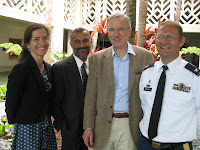In a year of disasters that has included tornados, fatal floods of the Mississippi River, Japan’s nuclear crisis, and the 10th anniversary of 9/11, Disaster Psychiatry is more relevant than ever. This morning at the Annual Meeting, the Committee on Psychiatric Dimensions of Disasters sponsored a basic course on Disaster Psychiatry.
Highlights included a role play featuring Colonel David Benedek of USUHS playing a stressed pilot, Dr. Kristina Jones of NYU as a well-intended but hyperactive flight attendant, and Dr. Anand Pandya of UCLA as a traumatized whiskey-gulping bereaved man. Dr. Fred Stoddard of Harvard Medical School came to the rescue as the Disaster Psychiatrist. Audience members helped simulate the chaos of disaster mental health interventions.
“If only our new book, Disaster Psychiatry : Readiness, Evaluation and Treatment, were available in these kinds of situations!” said Dr. Stoddard, lead editor of the book, co-authored by the Group for the Advancement of Psychiatry and Disaster Psychiatry Outreach. “The role play exercise certainly engaged the audience and stimulated discussion, and as a career Army guy, I was happy to play a flyboy for a brief moment,” said Dr. Benedek.
Questions from national and international members of the audience from the Netherlands, Denmark, and Haiti highlighted that American Psychiatry has developed a strong body of knowledge for how psychiatry can intervene in human-made and man-made disasters.
“Given all the tragedies that have occurred this year, it is tempting to want to believe that we have somehow reached our quota, and can now rest easy. But the course helped the audience to consider how to prepare for future disasters and ensure that psychiatry is appropriately integrated into response and aftercare," said Dr. Pandya.



No comments:
Post a Comment